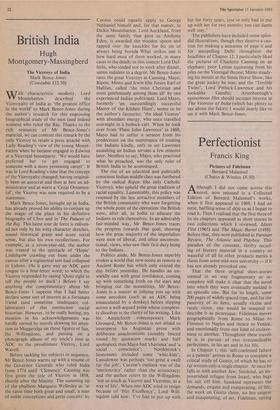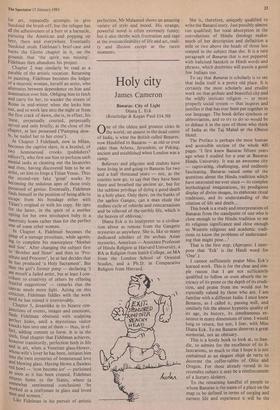Perfectionist
Francis King
Pictures of Fidelman Bernard Malamud (Chattel & Windus £8.50)
Although I did not come across this novel, now reissued in a Collected Edition of Bernard Malamud's works, when it first appeared in 1969, I had an eerie, baffling sense of ddja vu as I began to read it. Then I realised that the first three of its six chapters appeared as short stories in two collections which I reviewed, Idiots First (1965) and The Magic Barrel (1958). Before that, they were published in Partisan Revieiv, The Atlantic and Playboy. This paradox of the constant, thrifty recycl- ing of literary material in a country so wasteful of all its other products merits a thesis from some mid-west university — if it has not already provoked one.
That the three original short-stories seemed in no way fragmentary or in- complete will make it clear that the novel into which they were eventually melded is an episodic one. But for its length, some 200 pages of widely spaced type, and for the passivity of its hero, usually victim and rarely victor, one would be tempted to describe it as picaresque. Fidelman moves geographically from Rome to Milan to Florence to Naples and thence to Venice, and emotionally from one kind of enslave- ment to another. Throughout these travels he is in pursuit of two irreconcileable perfections, in his art and in his life.
In Chapter 1, this 'self-confessed failure as a painter' arrives in Rome to complete a critical study of Giotto, of which he has so far written only a single chapter. At once he falls in with another Jew, Susskind, an im- poverished refugee from Israel, who begs his suit off him. Susskind represents the demands, exigent and exasperating, of life; the work on Giotto those, no less exigent and exasperating, of art. Fidelman, opting for art, repeatedly attempts to give Susskind the brush-off; but the refugee has all the adhesiveness of a burr or a barnacle, pursuing the American and popping up here, there and everywhere. Eventually Susskind steals Fidelman's brief-case and burns the Giotto chapter in it, on the grounds that 'the spirit was missing'. Fidelman then, abandons his project.
Chapter 2 may similarly be read as a parable of the artistic vocation. Returning to painting, Fidelman becomes the lodger of a neurotic woman, herself an artist, who alternates between dependence on him and domination over him. Obliging him to fetch and carry for her, to wander the streets of Rome in mid-winter when she locks him out, and to work late into the night or from the first crack of dawn, she is, in effect, his muse, perpetually courted, perpetually served and only briefly, at the close of the chapter, at last possessed (Pumping slow- ly, he nailed her to her cross').
In Chapter 3 Fidelman, now in Milan, becomes the captive slave, in a brothel, of two homosexual crooks (publishers? editors?), who first use him to perform such Menial tasks as cleaning out the lavatories and then, having discovered him to be an artist, set him to forge a Titian Venus. Thus the second-rate fake 'great' works by becoming the sedulous apes of those truly Possessed of genius. Eventually, Fidelman finds himself in the position of being able to escape from his bondage either with Titian's original or with his copy. He opts for the latter, in the spirit of a mother opting for her own misshapen baby in a Maternity home rather than for the perfect one of some other woman.
In Chapter 4, Fidelman becomes the Pimp of a teenage prostitute, while agonis- ing to complete his masterpiece •'Mother and Son'. After changing the subject first to 'Brother and Sister' and then to 'Pro- stitute and Procurer', he at last decides that he has produced 'a Holy Sacrament'. But then the girl's former pimp — declaring 'I am myself a failed artist, but at least I con- tribute to ,creativity of others by offering fruitful suggestions' — remarks that the canvas needs more light. Acting on this criticism, Fidelman fiddles with the work until he has ruined it irretrievably. Chapter 5, dreamlike in its bizarre con- junctions of events, images and emotions, finds Fidelman obsessed with sculpting Perfect holes, until a mysterious visitor knocks him into one of them — thus, in ef- fect, adding content to form. It is in the sixth, final chapter that Fidelman achieves, however transitorily, perfection both in life and in art, when a Venetian glass-blower, whose wife's lover he has been, initiates him into the twin mysteries of homosexual love and blowing glass. Having blown a flawless red bowl — 'iron ,become ice' — purloined as soon as it has been created, Fidelman returns home to the States, where (a somewhat sentimental conclusion) 'he Worked as a craftsman in glass and loved Men and women.'
Like Fidelman in his pursuit of artistic perfection, Mr Malamud shows an amazing variety of style and mood. His strange, powerful novel is often extremely funny; but it also throbs with frustration and rage at the irreconcileability of life and art, reali- ty and illusion except at the rarest moments.







































 Previous page
Previous page